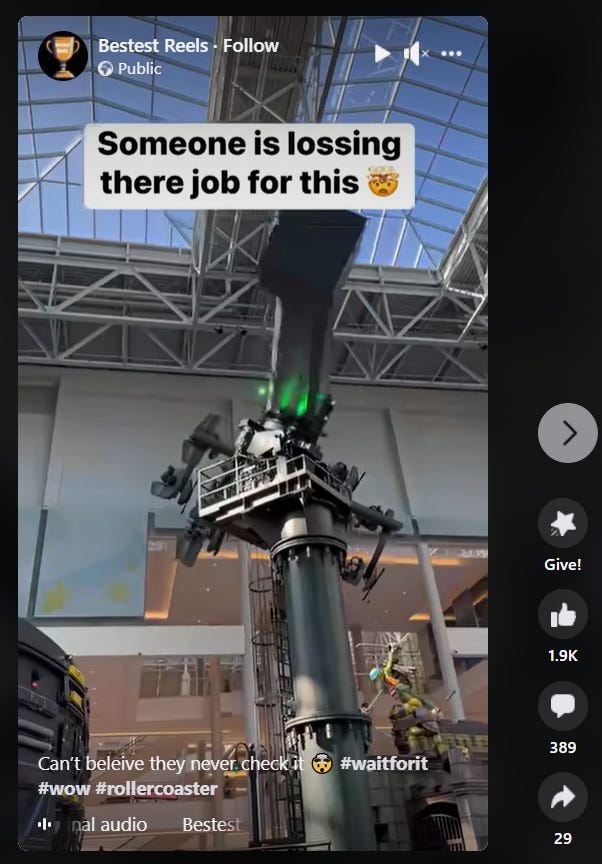Give up on content
Why the rise of 'bait' videos should spell the end of content as a concept for brands.
"What you rappin' for, to get fame or get rich?"
In a previous life, I worked in the music industry, doing college and club promotions for various artists. It may sound glamorous; it really wasn't, but it had its moments. One was going to an album playback of Common's 2005 'Be' album (which criminally wasn't a breakthrough smash). Album playbacks were typically dull affairs - you sit and listen to an album in full because of piracy paranoia, feigning enthusiasm even if it was the most enormous pile of dross you've heard in your life. Also, record labels always play their records EXTREMELY LOUD on the most expensive sound systems, making anything sound better than how your audience will hear it.
Anyway, Common's album playback was different because he was there.
He introduced every song and even rapped a verse from 'Chi-City' live because the album version wasn't quite finished. When the album finished, he went around the room and asked everyone what their two favourite songs were to check we'd been paying attention.
That song 'Chi-City' includes the line "What you rappin' for, to get fame or get rich?". Common admonishes this pretender, telling them to remember the story of Rick James. It's a shout-out to artistic purity, a paean to the roots of hip hop when rappers entertained their local neighbourhood with zero expectation of recognition. They did it because they loved it. But for all Common's reminders of Rick James, anyone getting into music harbours dreams of making it big. That dream might be an extremely remote possibility for a covers band playing at a local pub to 10 people, but it's a dream that refuses to die. All they need is that one break, a slither of recognition from someone influential that triggers the pieces to fall into place.
'Be' is nearly 20 years old, but that line about why someone creates is more relevant than ever. Just replace "rappin'" with "posting on social video platforms". There was no revenue sharing in the 2000s; people posted or blogged to share how much they loved something or connect with like-minded people. The game's changed; fandoms aim to control the franchises they love. Creators who get a taste of virality inevitably change their output to further chase that fame and those riches. Just this week,
told the story of an influencer called Zesu and how she pivoted into playing an "entitled creator character" after it generated engagement on TikTok and Twitter. There are plenty of examples of people following the engagement, no matter how unsavoury the place it leads them. There's an accompanying theory that many people who went seriously right-wing online weren't actually "radicalised" by YouTube but were doing it to chase the clout.That may be a more complex theory to prove, but the playbook for finding fame and riches online in 2023 is becoming apparent.
1. Post as many videos as possible on as many different topics as possible.
2. Aim to bake engagement into your videos; increasingly, Reels become popular due to the number of comments they generate. Identify the formula that produces the most engagement, then lean into that and maximise that formula before it runs out of juice.
Reading this, you might be thinking about 'engagement' in a traditional way - encouraging discussion, sharing inspiration that others can relate to, or experiences that tap into that powerful feeling of nostalgia. But all engagement is equal in the eyes of algorithms, and increasingly creators and content farms are using 'bait' to juice the algorithms and get that fame and riches.
Bait is typically seen in videos, designed to tap into the basest emotions that get people riled up and commenting in their droves. In Zesu's case, this is acting like an entitled influencer and getting "angry" with a waiter because your food hasn't arrived in a perfect Instagram-able state.
has an excellent piece on his Substack where he took a deep dive into the weird world of Facebook Reels bait videos. Videos captioned with things like "You're enjoying your cruise, but then THIS happens!" but nothing actually happens in the video.Facebook users watch the videos, drawn in by the clickbait-y headline, miss the promised pay-off, and then comment on the video to try and find "meaning in the meaninglessness". Essentially saying, "Did I miss something?". It's a cottage industry, which now it's been written about, will probably get deprioritised in Meta's next algorithm update. But for now, the race is to make as many of these videos as possible and extract the maximum financial return before the trend ends.
Ryan and Freddie see the 'bait' trend as a significant stop on our seemingly inevitable road to the end of "content" as a concept. How long will users put up with being permanently outraged before it outweighs the desire to distract and entertain themselves? My gut tells me it will be longer than we think, but throw a breakthrough generative AI tool for video into the mix, and the process will likely be speeded up exponentially.
And if we are reaching the end of the age of content, what does that mean for brands? "We should make some content for this campaign" has long been an essential lever to pull in comms (I remember it appearing out of nowhere early in 2013). For many companies, particularly consumer-facing brands, content means images and video for organic social media plans and more extensive paid campaigns. But content is now such a broad term in agency land that it is essentially meaningless.
If a concept can be applied to everything from a movie (!) to a webinar or a white paper and means completely different things to different people, I'd argue that it ended long ago. I've been trying (and failing) to avoid using it in client conversations for the past four years. It can be helpful as a shorthand, but its vagueness is inherently unhelpful. Add this vagueness to a new sense that content (particularly videos) isn't always a good thing means it's the perfect time to try and eliminate the word from our lexicon, at least when planning campaigns.
Two crucial reasons for not talking about "content". Firstly, as mentioned above, it's a vague catch-all term that needs more specificity. If you say to a client, "Yeah, we'll create some content to support this campaign", your mind might instantly go to a slickly produced influencer-led video that looks perfect on TikTok. Your client might be thinking about a beautifully designed PDF and a thought piece from the CEO that looks great on their website.
Get specific straightaway. Don't talk about content; go through the particular assets you have in mind - and get to those specific assets as quickly as possible. That way, you can be sure you're on the same lines as everyone else.
The other reason to get specific quickly is that we sometimes act like creators or content farms when planning campaigns: assuming that we need loads of "content" to succeed. Creating loads of different assets and posts may bulk out your plan, but it is a futile exercise unless you're clear on the role and purpose of every piece of work you're creating.
Every asset needs to be working hard in a campaign. If you're spending money on creating that asset and then spending money to promote it (assuming you're not a brand dedicated to making 'bait' videos), then it needs a role. It must be more than just filling up the space in a content matrix. And given that engagement is so weighted in 2023 to posts that appeal to our basest emotions, the importance of getting the right paid spend in place has never been higher.
At Teneo, we use (thanks to my brother from another mother, Sean Earley) the 40/60 rule. Spend 40% of your total budget creating your assets; 60% promoting them. If you're spending £20k on a video and £5k promoting it, your creative efforts are potentially going to waste. Unless, of course, you spent £15k making a whole bunch of bait videos that use titles like "Only people born before 1987 remember this". But I don't imagine many of you are.
Competing for attention has never been more challenging. Businesses are not only going up against their competitors and adjacent companies but also posts people love, and now posts that people love to hate.
Standing out means retaining a clear-eyed focus on why you're doing this in the first place - the business of creativity is tricky; don't waste your time and energy working on something that won't generate an impact for your business or your clients. Fame and riches may be a general objective online, but it's not for everyone.



